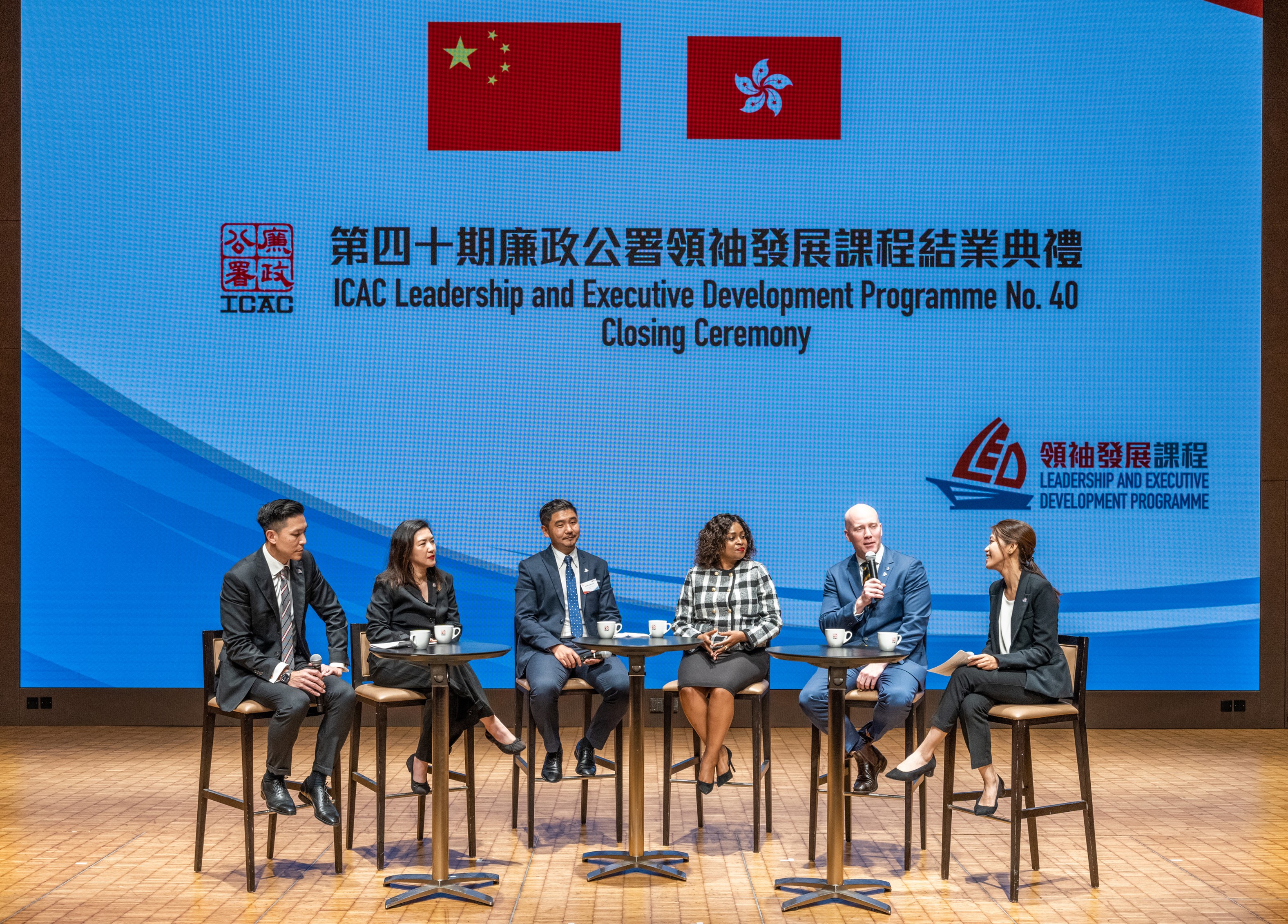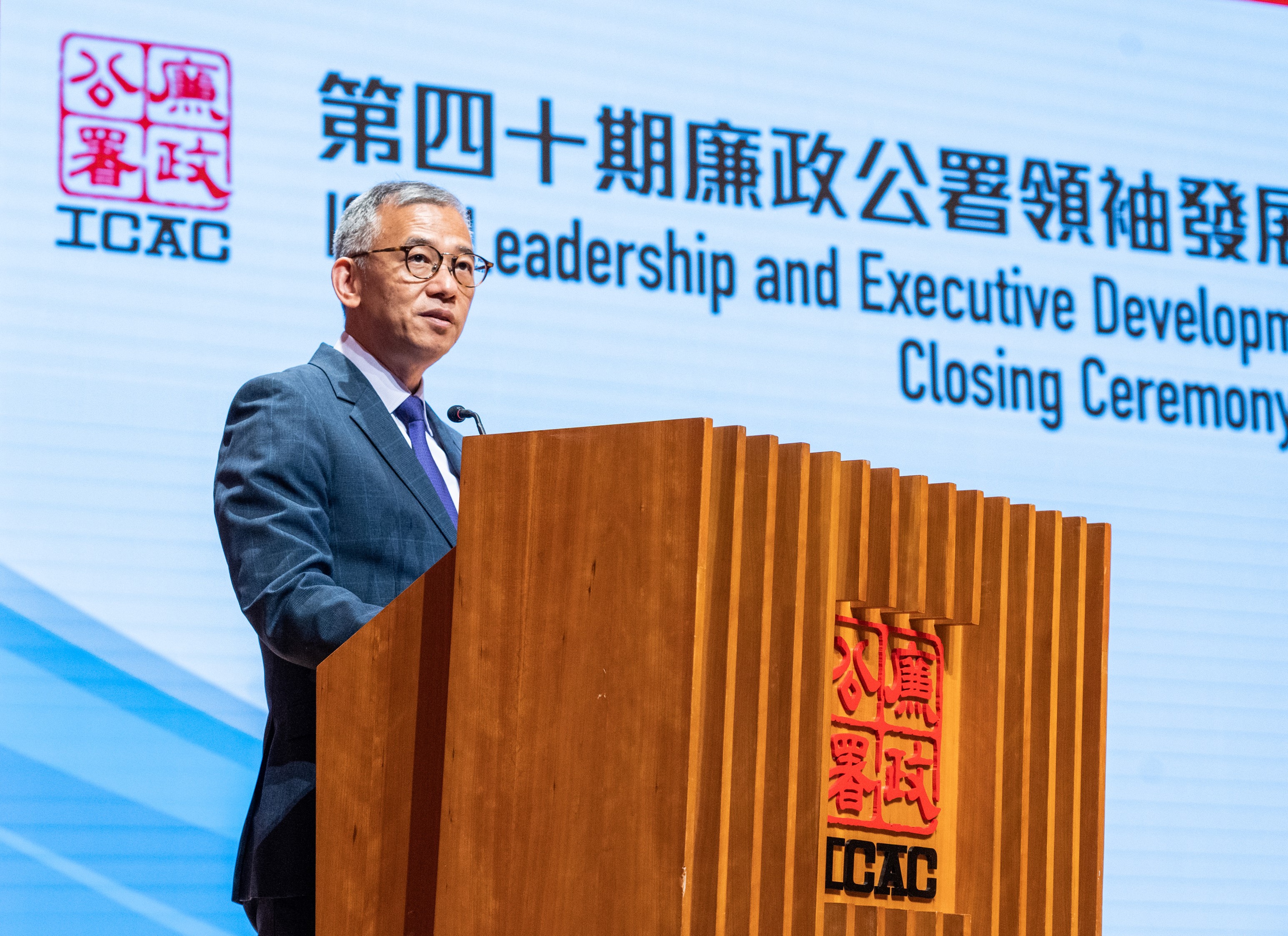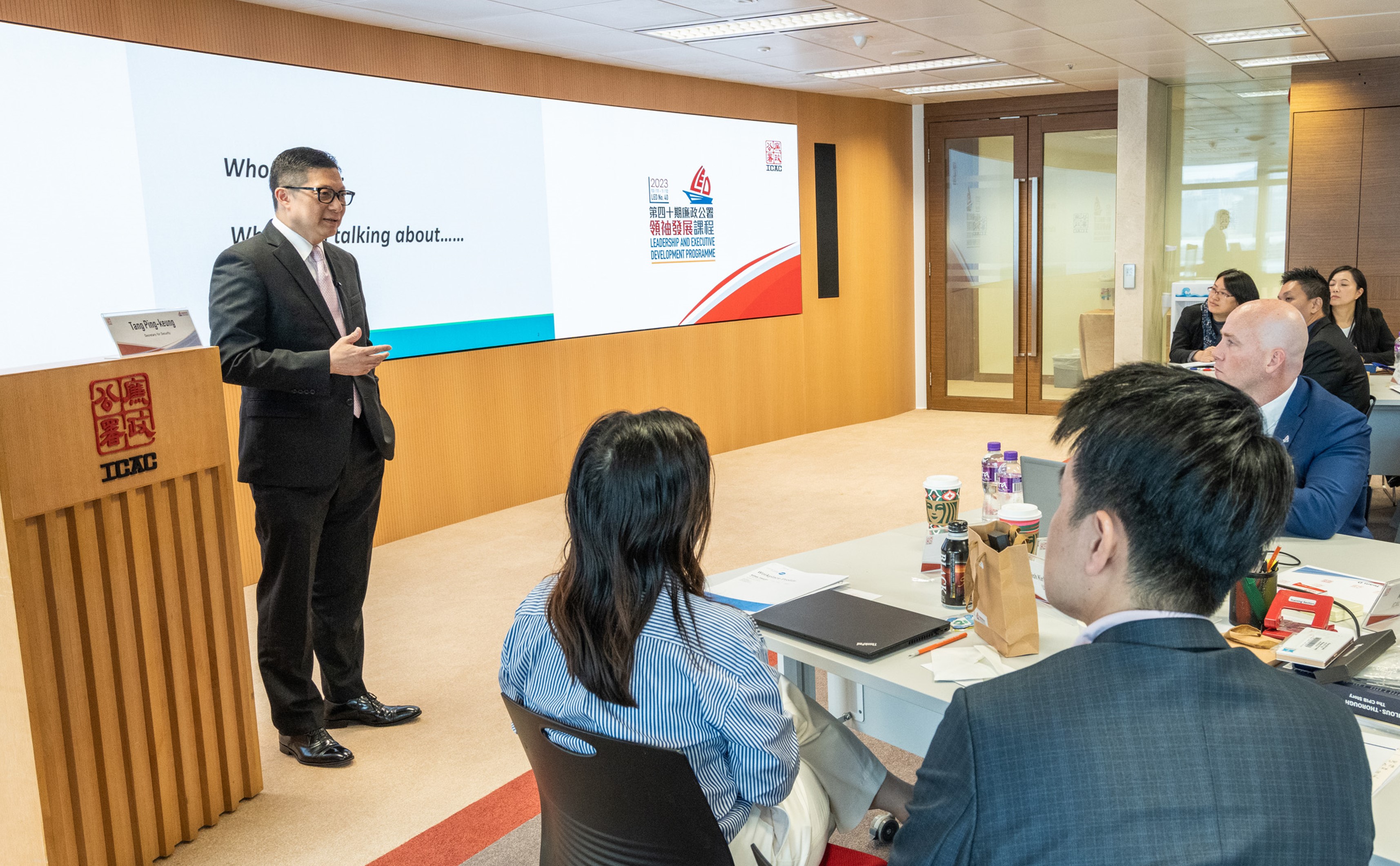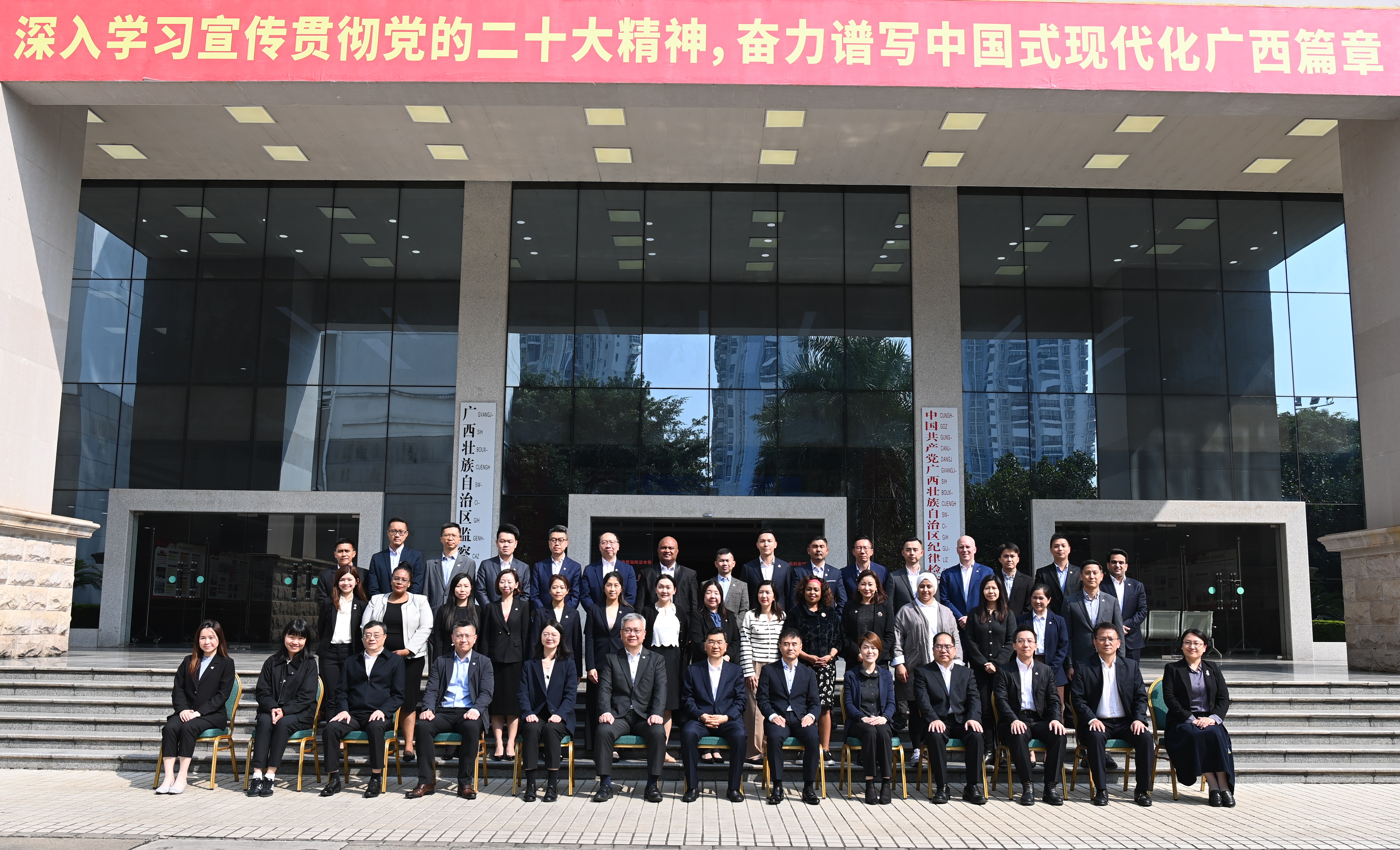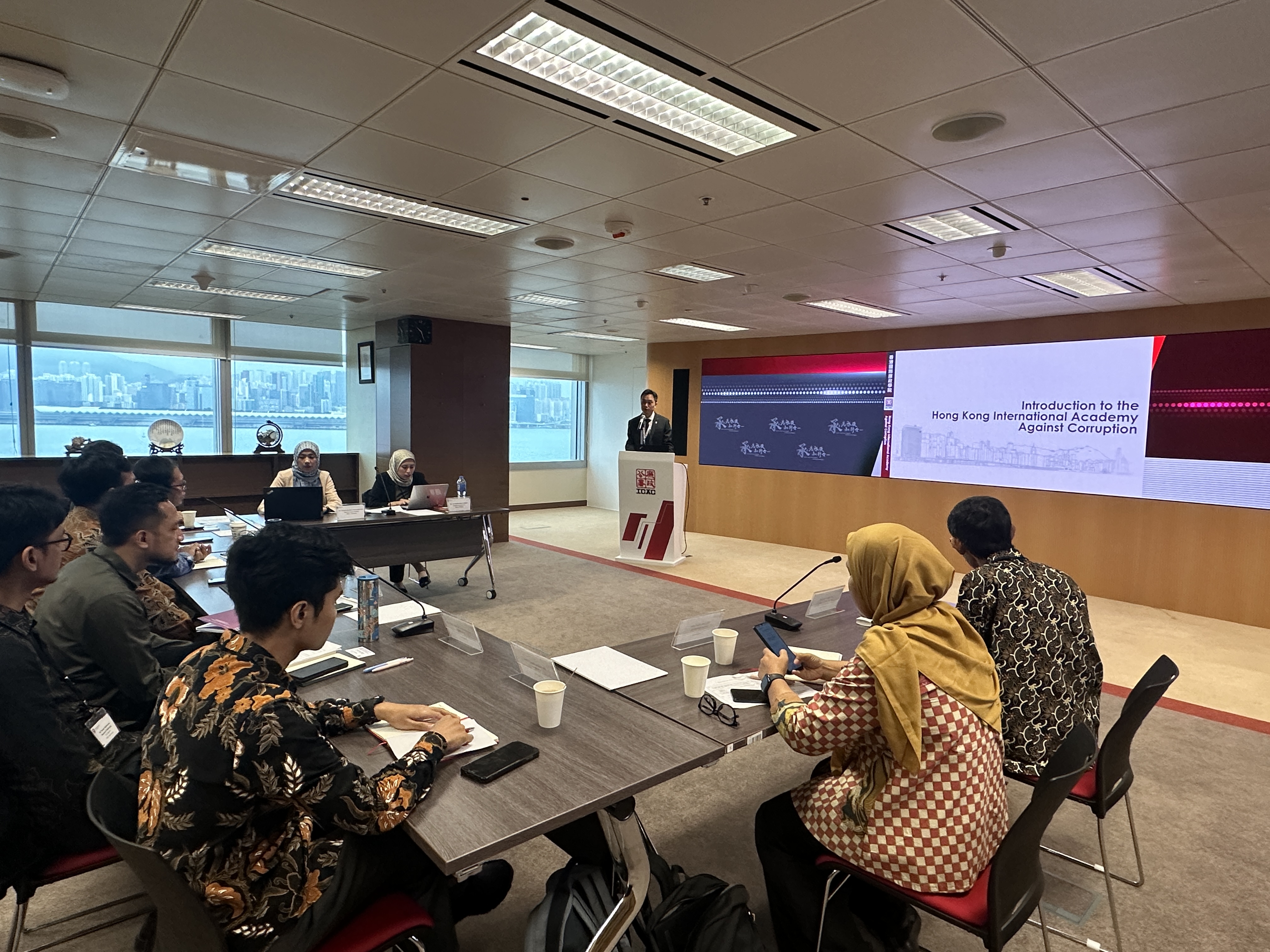HKIAAC’s flagship leadership course gathers global participants to foster anti-graft cooperation and promote ‘Clean Silk Road’
2023-12-1
Thirty-one representatives from local and overseas law enforcement agencies who today (December 1) completed a three-week ICAC Leadership and Executive Development (LED) Programme will bring home insights and experience learnt from each other and lay a solid foundation for fostering international collaboration in future.
Speaking at the closing ceremony of the LED Programme No. 40, Mr Woo Ying-ming, ICAC Commissioner, remarked that the programme was one of the flagship courses of the Hong Kong International Academy Against Corruption (HKIAAC) which would be established in the first quarter of 2024. The programme echoed ICAC’s efforts in recent years to join hands with Belt and Road (B&R) countries in strengthening international anti-corruption capacity-building, with a view to building a “Clean Silk Road” based on the principles of “inclusive dialogue”, “collective efforts” and “shared benefits”.
Apart from encouraging LED Programme participants to contribute to the global anti-corruption cause, the ICAC Commissioner also called on guests attending today’s ceremony to cast their votes on the polling day of the District Council Election.
Restructured from the former ICAC Chief Investigators’ Command Course, the LED Programme is set to enhance its contents and further strengthen partnership and collaboration among anti-graft and law enforcement agencies worldwide.
Mr Ricky Yau Shu-chun, Deputy Commissioner and Head of Operations of the ICAC, earlier told participants at the opening ceremony of the LED Programme that this year marked the 20th anniversary of the United Nations Convention against Corruption (UNCAC). Under the UNCAC, the Central People’s Government appointed the ICAC to assist other state parties of the convention in enhancing their capabilities in combating corruption, strengthening cooperation with anti-graft agencies among different jurisdictions, and providing appropriate training programmes. Hence the LED Programme was a key component of the ICAC’s commitment to this mission.
Joining the LED Programme for the first time, Kenya, an East African B&R country, was represented by Ms Joyce.W.Munene, HSC, Acting Assistant Director of the Ethics and Anti-corruption Commission of Kenya. Ms Munene said the LED Programme provided her with a first-hand understanding about the ICAC’s robust anti-corruption strategy which was proven to be successful in the past 50 years. She added that the model was of good reference value for her country.
“Kenya strives to promote integrity, accountability and good governance in recent years. We are planning to introduce automation technology into our investigation processes to improve work efficiency. The LED Programme was an eye-opener for me. Hong Kong’s anti-corruption efforts are up-to-date, using technology to enhance its investigative effectiveness. I will share the experiences I gained from the LED Programme with my colleagues in Kenya,” Ms Munene added.
Bhutan has been a loyal supporter of the LED Programme in recent years. Mr Kelden Jamtsho, Deputy Chief Legal Officer of the Anti-Corruption Commission of Bhutan, applauded the LED Programme for facilitating knowledge exchange and experience sharing among anti-bribery professionals around the world. He noted that officers from Bhutan could always gain new insights from anti-corruption training in Hong Kong.
“Fighting corruption is a challenging task which relies on a team of professional officers. I am pleased that the LED Programme provided insights on how leadership could help institutions overcome difficult times and issues, while at the same time enhance their anti-bribery capabilities,’ Mr Jamtsho said.
Ms Irish Kirbee V. Tibayan, National Anti-corruption Programme Officer of the United Nations Office on Drugs and Crime (UNODC), expressed her appreciation for the LED Programme which provided the opportunity for face-to-face exchanges with participants worldwide after the pandemic in the past three years. She was the first UNODC representative attending the LED Programme.
“In the past three weeks, participants have built genuine and solid trust and partnership through interactions. I believe our bonds will contribute to future cooperation and other initiatives in combating corruption,” Ms Tibayan noted.
For the first time, principal politically appointed officials of the Hong Kong Special Administrative Region were invited to speak at the LED Programme. Mr Horace Cheung Kwok-kwan, Deputy Secretary for Justice; and Mr Tang Ping-keung, Secretary for Security, shared with participants their insights on law enforcement and the rule of law in the new era.
Other guest speakers included Mr Bernard Charnwut Chan, Chairman of the Operations Review Committee; Dr Tony Ko Pat-sing, Chief Executive of the Hospital Authority; Mr Christopher Wilson, Executive Director (Enforcement) of the Securities and Futures Commission; Mr David Jordan, Regional Commander of Marine of the Hong Kong Police Force; and Ms Dora Si Yuk-fung, Acting Deputy Principal Government Counsel (Mutual Legal Assistance) of the Department of Justice.
During the LED Programme, ICAC representatives illustrated different aspects of the work of the Commission through case studies, its “three-pronged” strategy encompassing law enforcement, prevention and education, as well as investigative skills and application of technology, etc. Participants also visited various places, including law enforcement agencies, to deepen their understanding of Hong Kong.
The LED Programme also featured a six-day study tour to various authorities in Guangxi Zhuang Autonomous Region, including its Commission for Discipline Inspection and Supervision, providing participants with an opportunity to gain first-hand knowledge of Mainland’s latest development in integrity building, industrial technology and environmental conservation.
This year, overseas participants of the LED Programme came from 13 agencies, five of which joining for the first time. They were the United Nations Office on Drugs and Crime; the Ethics and Anti-corruption Commission of Kenya; the National Accountability Bureau of Pakistan; the Oversight and Anti-Corruption Authority of Saudi Arabia; and the Office of Public Sector Anti-Corruption Commission of Thailand. Other overseas participants came from the Australian Federal Police; the Anti-Corruption Commission of Bhutan; the Anti-Corruption Bureau of Brunei Darussalam; the Independent Commission Against Corruption of Fiji; the Malaysian Anti-Corruption Commission; the Corrupt Practices Investigation Bureau of Singapore; the Singapore Police Force; and the Special Investigating Unit of South Africa.
Also attending the LED Programme were three officials from the Central Commission for Discipline Inspection and National Commission of Supervision of the People’s Republic of China, and the Commission Against Corruption, Macao, SAR. Locally, 15 participants completed the LED Programme, including eight ICAC officers and seven law enforcers from the Correctional Services Department, the Customs and Excise Department, the Fire Services Department, the Immigration Department, the Hong Kong Police Force, the Securities and Futures Commission, and the Accounting and Financial Reporting Council which was a first-timer.
The LED Programme is one of the ICAC’s major initiatives in enhancing international anti-graft cooperation, providing training for over 800 local and overseas participants since the late 1970s.
